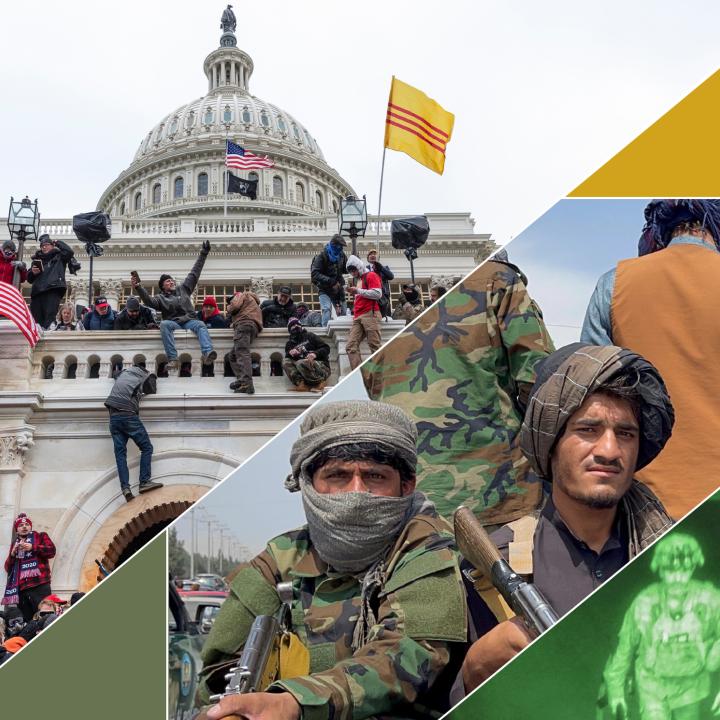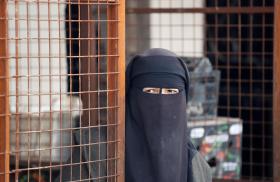
- Policy Analysis
- Policy Focus 177
U.S. Counterterrorism Reimagined: Tracking the Biden Administration's Effort to Reform How America Addresses Violent Extremism

Part of a series: Counterterrorism Lecture Series
or see Part 1: U.S. Efforts against Terrorism Financing: A View from the Private Sector
This collection reveals the growing prevalence of nonkinetic tools while exploring the balance authorities must strike between preventing attacks and protecting civil rights.
Two very different events epitomized the CT/CVE challenge facing the incoming Biden administration in 2021: the January 6 insurrection at the Capitol and the August U.S. troop withdrawal from Afghanistan. The first reflected the sharp rise in violent extremism from white supremacists, anti-government actors, and other similar figures, while the second presented the disturbing prospect of Taliban-ruled Afghanistan as a haven for Islamist terrorism. These watershed moments occurred as Washington sought to free up funds to address a wide range of equally important national security issues, from the rise of China and Russia, to climate change, domestic infrastructure needs, and public health issues.
The tenth volume of The Washington Institute’s Counterterrorism Lecture Series, edited by Matthew Levitt, covers the period January 2021 to March 2022. While revealing a trend toward nonkinetic tools—as indicated by a full-day Institute panel devoted to the subject—the selections also probe the delicate but necessary balance officials must strike between preventing attacks and protecting civil rights.
(The speakers are listed below; positions are those held at the time of the lecture.)
- Paul Ahern, principal deputy secretary, Office of Terrorist Financing and Financial Crimes, U.S. Department of the Treasury
- Gabriele Cascone, head of the Counterterrorism Section, Emerging Security Challenges Division, NATO
- John D. Cohen, counterterrorism coordinator and senior official performing the duties of the under secretary, U.S. Department of Homeland Security
- Christopher Costa, director, International Spy Museum
- Louis Dugit-Gros, visiting fellow, TWI, and member, French Ministry for Europe and Foreign Affairs
- Naureen Chowdhury Fink, executive director, Soufan Center
- Marc Hecker, director of research and communications, French Institute of International Relations
- Robert Jenkins, assistant to the administrator, Bureau for Conflict Prevention and Stabilization, USAID
- Gilles de Kerchove, counterterrorism coordinator, European Union
- Daniel Kimmage, principal deputy coordinator, Global Engagement Center, U.S. State Department
- Christopher Landberg, acting principal deputy coordinator, Bureau of Counterterrorism, U.S. State Department
- Matthew Levitt, Fromer-Wexler Fellow and director, Reinhard Program on Counterterrorism and Intelligence, TWI
- Katrina Mulligan, acting vice president for national security and international policy, Center for American Progress
- Laurent Nuñez, national coordinator for intelligence and counter-terrorism, France
- Olivier Onidi, deputy director-general for migration and home affairs, European Commission
- Patrick E. Reddan Jr., deputy assistant, Counterterrorism Division, FBI
- Jill Rose, deputy director, Office of Overseas Prosecutorial Development, Assistance, and Training, U.S. Justice Department
- Nate Rosenblatt, doctoral candidate, University of Oxford, and International Security Program fellow, New America
- Ilkka Salmi, counterterrorism coordinator, European Union
- Damon Stevens, assistant director for strategic operational planning and national intelligence manager, U.S. National Counterterrorism Center
- Elie Tenenbaum, research fellow, French Institute of International Relations





